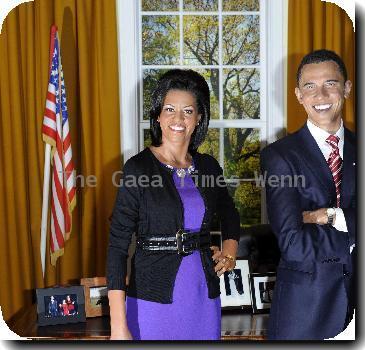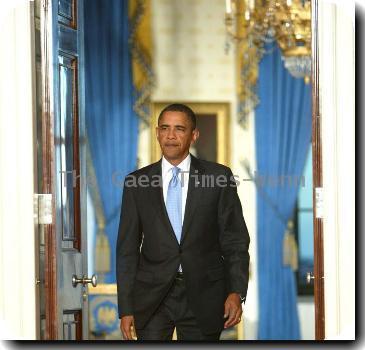Obama welcomes apparent Senate breakthrough on bill regulating Wall Street
By Julie Pace, APWednesday, April 28, 2010
Obama welcomes end of financial regulation impasse
QUINCY, Ill. — President Barack Obama hailed a Senate breakthrough on legislation to regulate Wall Street, saying Americans must never again allow the financial practices that triggered an economic meltdown nearly two years ago.
In a campaign-style speech on Wednesday, the president said he believes Congress can agree on a far-reaching regulatory bill. He said it must end taxpayer bailouts of failed banks, shine light on complex investments known as derivatives, grant greater protections to financial consumers and give stockholders more say in how Wall Street firms are run.
He told about 2,300 people in this Mississippi River town that he was pleased to learn that Senate Republicans apparently had agreed to let a financial regulatory bill reach the floor for debate. “The time for reform is now,” he said. Republicans later signaled they would drop their objections to moving ahead on the bill.
Obama capped his two-day, three-state Midwestern tour with one of his most sustained criticisms of Wall Street abuses. Some major firms, he said, had operated like casinos, setting up investment instruments in which they would win and some consumers would lose, no matter which way a commodity moved.
Some financial executives had acted as though they were playing with “Monopoly money,” he said, and stockholders should have more say in what these executives are paid and how they run their businesses.
Obama disputed claims that legislation before Congress would lead to further public bailouts of banks considered too big to fail. He said he wants to make sure the taxpayer “is never again on the hook when a Wall Street firm fails.”
He said financial derivatives should be brought “out of dark alleys into the light of day.” Some derivatives, which were based on mortgages held by borrowers unable to make their payments, contributed to the crisis that clobbered the housing market in 2009-2010 and triggered further economic disruption.
Obama rejected Republican complaints that congressional Democrats want to push new consumer protections too far. Financial products should be less confusing and more transparent, he said. “You should know what you’re buying,” he said.
His appeal came as Senate Republicans seemed ready to soften their stand after three times blocking Democrats’ efforts to bring their Wall Street bill to the floor for debate and eventual votes. It also came one day after lawmakers excoriated Goldman Sachs executives for “unbridled greed” for their business practices.
On the second day of his visit to three corn-growing states, Obama also reaffirmed the goal of tripling U.S. ethanol production in 12 years, in part to make the nation less dependent on foreign oil. He made the remarks after touring the POET Biorefining plant in Macon, Mo. A day earlier in Iowa, Obama had toured a plant that builds wind turbines.
Obama’s visit to Missouri, Illinois and Iowa has the look and feel of a political campaign, with camera-friendly stops for pie and burgers. He hailed the recently enacted health care overhaul and called for greater investments in renewable energy and in education that can lead to new and better jobs.
Obama is not on the ballot this fall, but his fellow Democrats face a tough landscape brought on in part by the public’s wariness of his handling of the economy. The president and Democratic lawmakers have painted Republicans as obstructionists who stand on the side of Wall Street bankers, not middle-class America.
Obama’s domestic trips often last just a few hours, but this one has a more leisurely feel. On a ride along U.S. Route 36 in Missouri that lasted nearly two hours — an unusually long time for a president to be on the road — students poured into parking lots and residents brought out lawn chairs and American flags to watch the motorcade pass.
Obama stopped at the 1,000-acre beef, hog and corn farm run by Lowell Schachtsiek of Palmyra, Mo. The president sat at the kitchen table with Schachtsiek and his family, discussing issues that affect farmers, especially health care.
Tags: Barack Obama, Illinois, Missouri, North America, Personnel, Quincy, United States, Us-obama



